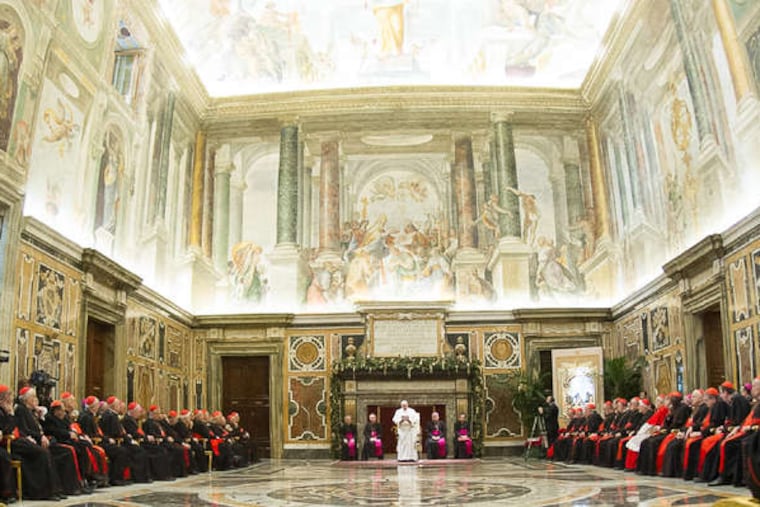Pope Rebukes Vatican
Every year around this time, Pope Francis and the senior governing cardinals, bishops, and priests of the Vatican - referred to as the Curia - meet for an exchange of Christmas greetings. This year, Pope Francis brought a little something extra for the Curia: a 15-point "catalog" of spiritual diseases he has seen among leadership there and how a little bit of Christmas spirit might help to make things better.

Every year around this time, Pope Francis and the senior governing cardinals, bishops, and priests of the Vatican - referred to as the Curia - meet for an exchange of Christmas greetings. This year, Pope Francis brought a little something extra for the Curia: a 15-point "catalog" of spiritual diseases he has seen among leadership there and how a little bit of Christmas spirit might help to make things better.
It's not a perfect analogy, but Francis' Christmas greeting Monday was roughly the equivalent of a CEO sending his or her top executives off to Christmas vacation with a cleverly worded list of everything they do wrong at the company. Merry Christmas?
The list of diseases included "spiritual Alzheimer's," "spiritual petrification," a feeling of being "immortal," and "funeral face," a concept Francis referred to this month to prepare for Christmas with "joy," instead of dourness or anxiety. The pope also blasted gossiping among officials as a form of "satanic assassination." He said: "Sometimes, [officials of the Curia] feel themselves 'lords of the manor' - superior to everyone and everything."
Francis hoped that the Christmas season would help the governing body to heal some of what ails it.
"The Curia is called on to always improve itself and grow in communion, holiness, and knowledge to fulfill its mission," Francis said. "But even it, as any human body, can suffer from ailments, dysfunctions, illnesses."
Francis urged the prelates sitting stone-faced before him in the marbled Sala Clementina to use the Christmas season to repent and atone and make the church a healthier, holier place in 2015.
Vatican watchers said they had never heard such a powerful, violent speech from a pope and suggested that it was informed by the results of a secret investigation ordered up by Emeritus Pope Benedict XVI in the aftermath of the 2012 leaks of his papers.
Benedict tasked three trusted cardinals to probe deep into the Vatican's back-stabbing culture to root out what would have prompted a papal butler to steal incriminating documents and leak them to a journalist. Their report is known only to the two popes. La Stampa's Vatican Insider has the full list of 15 diseases Francis named. They also are available, in Italian, on the Vatican's press office site. Some of the highlights - or lowlights - depending on whether you are a member of the Curia or not:
On feeling "immortal": "A curia that does not practice self-criticism, does not keep up to date, does not try to better itself, is an infirm Body."
On what he means by "spiritual Alzheimer's": "A progressive decline of spiritual faculties" which "causes severe disadvantages to people," making them live in a "state of absolute dependence on their, often imagined, views." We can see this in those who have "lost their memory" of their encounter with the Lord, in those who depend on their "passions, whims and obsessions."
On the disease of "existential schizophrenia": This refers to "a double life, a result of the hypocrisy typical of mediocre people and of advancing spiritual emptiness, which degrees or academic titles cannot fill."
Some of the pope's harshest words were reserved for sins related to gossiping, which the pope likened to the actions of Satan. Gossip, he said, will grip a person and transform him into one of the "sowers of discord." Francis called gossips "cold-blooded murderers" of reputations. "It is the disease of cowards, who do not have the courage to speak upfront and so talk behind one's back. . . . Watch out against the terrorism of gossip!" he said.
As CNN noted, the pope may have made an oblique reference to the sex-abuse scandal while discussing a "disease of a closeness," which he said was a "cancer which threatens the harmony of the body and causes a lot of evil and scandal, especially towards our small brothers and sisters."
"These and other maladies and temptations," said Francis, according to Vatican Radio, "are a danger for every Christian and for any administrative organization, community, congregation, parish, ecclesial movement, etc., and can strike at both the individual and the corporate level."
This is not the first time Pope Francis has openly criticized the Curia, nor will it be the last. Before becoming pope, Francis was an outsider to the bureaucratic body of the Curia, which has a reputation for ineffectiveness and corruption. As pope, Francis has pledged to reform it.
"This is a speech without historic precedent," church historian Alberto Melloni, a contributor to Italian daily Corriere della Sera, said in a telephone interview. "If the pope uses this tone, it's because he knows it's necessary."
Melloni noted that until Francis was elected, the Vatican bureaucracy largely answered to no one, saying "an entire generation of the Curia ran it as if they were pope." St. John Paul II was too busy traveling the world, and later too sick, to pay attention to administrative details, and Benedict left the minutiae of running a government to his deputy, later determined to have been part of the problem.
The Rev. Robert Wister, a church historian at Seton Hall University, said Francis was essentially asking the Curia to undergo an examination of conscience, asking members to reflect on how they had sinned before God before going to confession.
The pope also met with many of the Vatican's employees (and their children) Monday, a meeting that was a little bit friendlier.